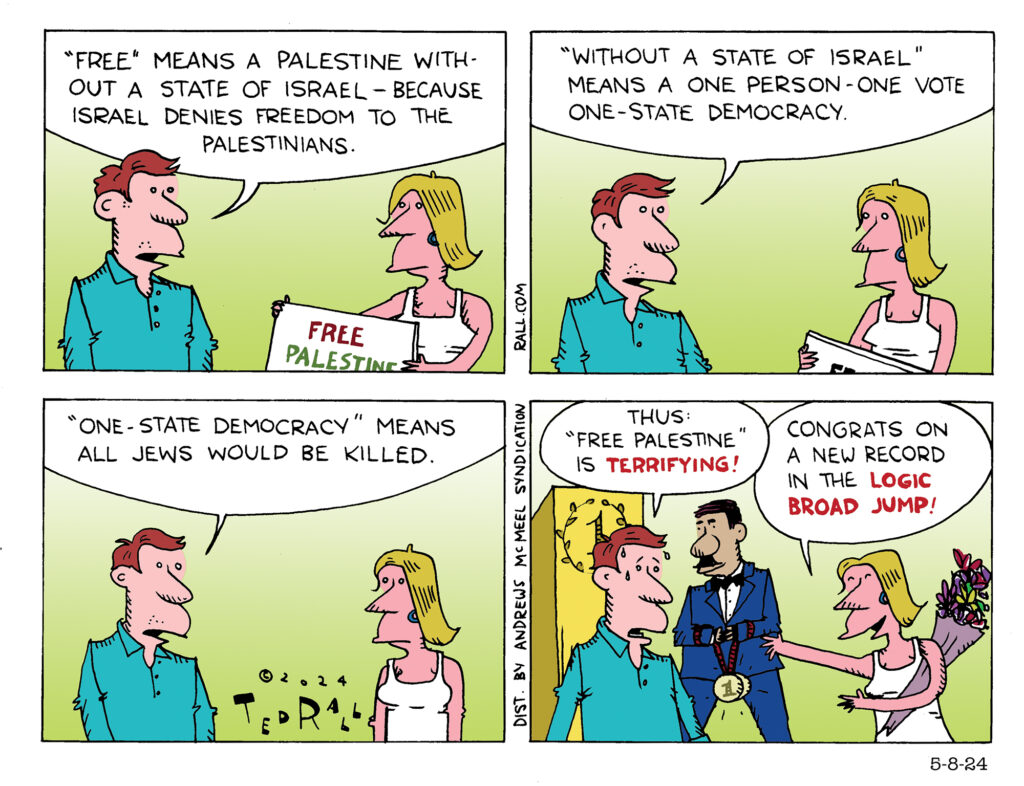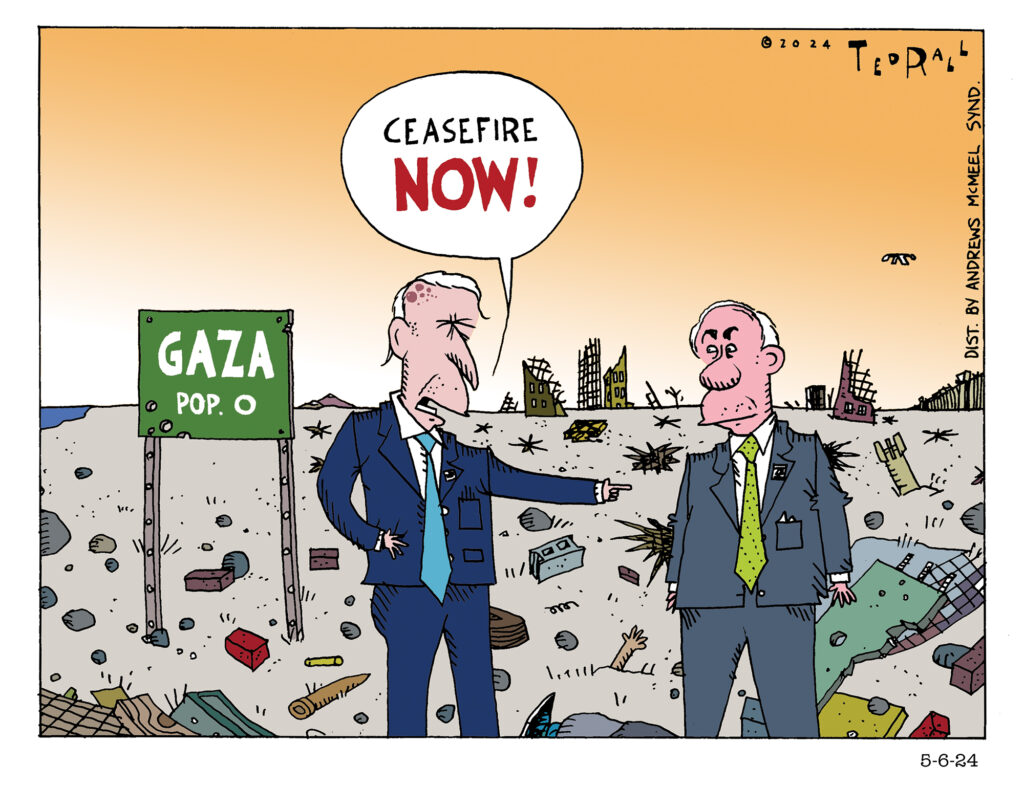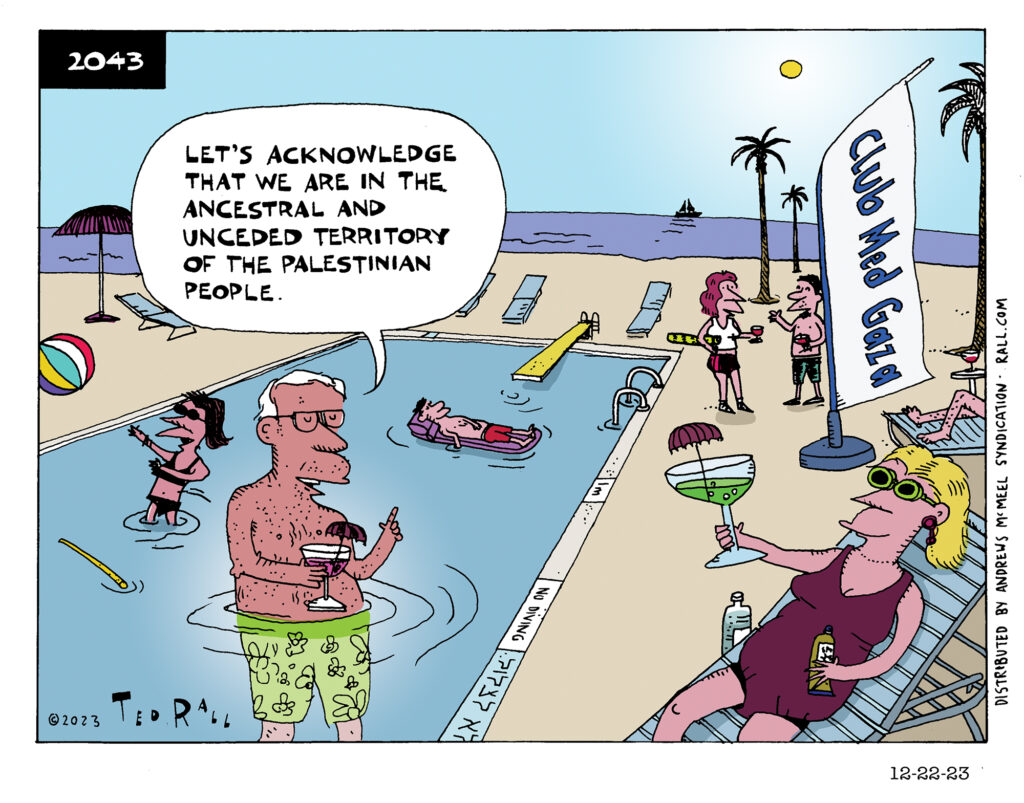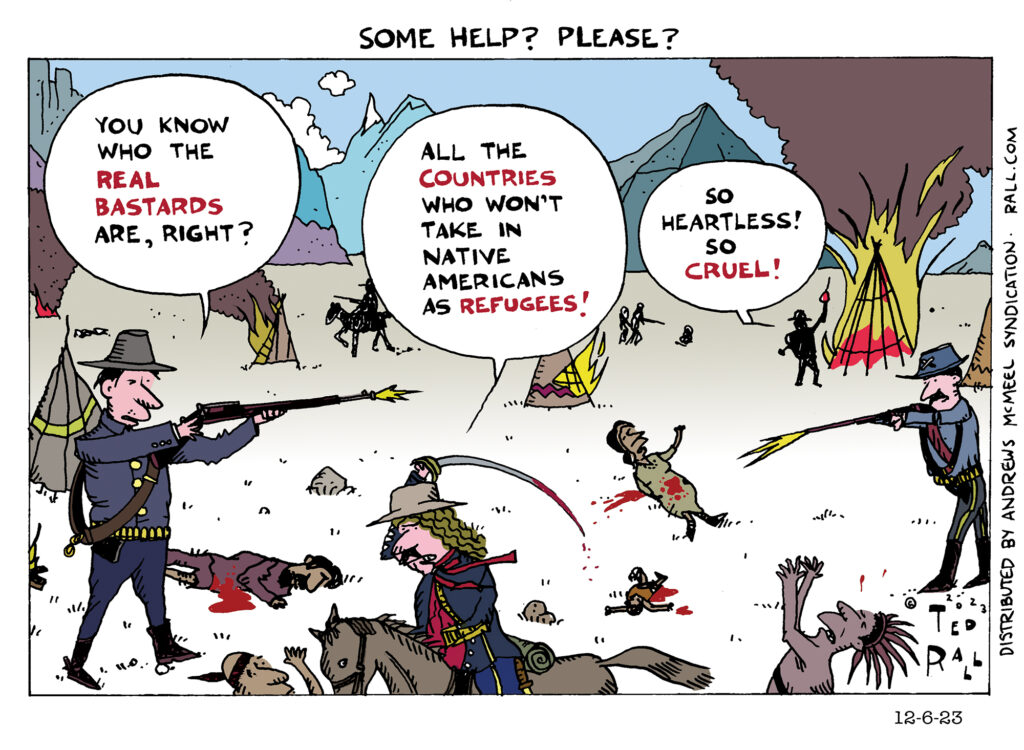The linguistic contortions used by supporters of Israel to accuse their critics of antisemitism are truly incredible.
Ceasefire…NOW.
Israeli Prime Minister Benjamin Netanyahu and his close ally President Joe Biden are both playing for time, pretending to be opposed to what’s going on while not changing anything. As Biden sends Netanyahu more money and more weapons, day by day the Gaza Strip is being ethnically cleansed. Even now, it’s probably too late for a ceasefire to do much good.
Ceasefire in Gaza, An Offer Israel Can’t Refuse—Yet It Is
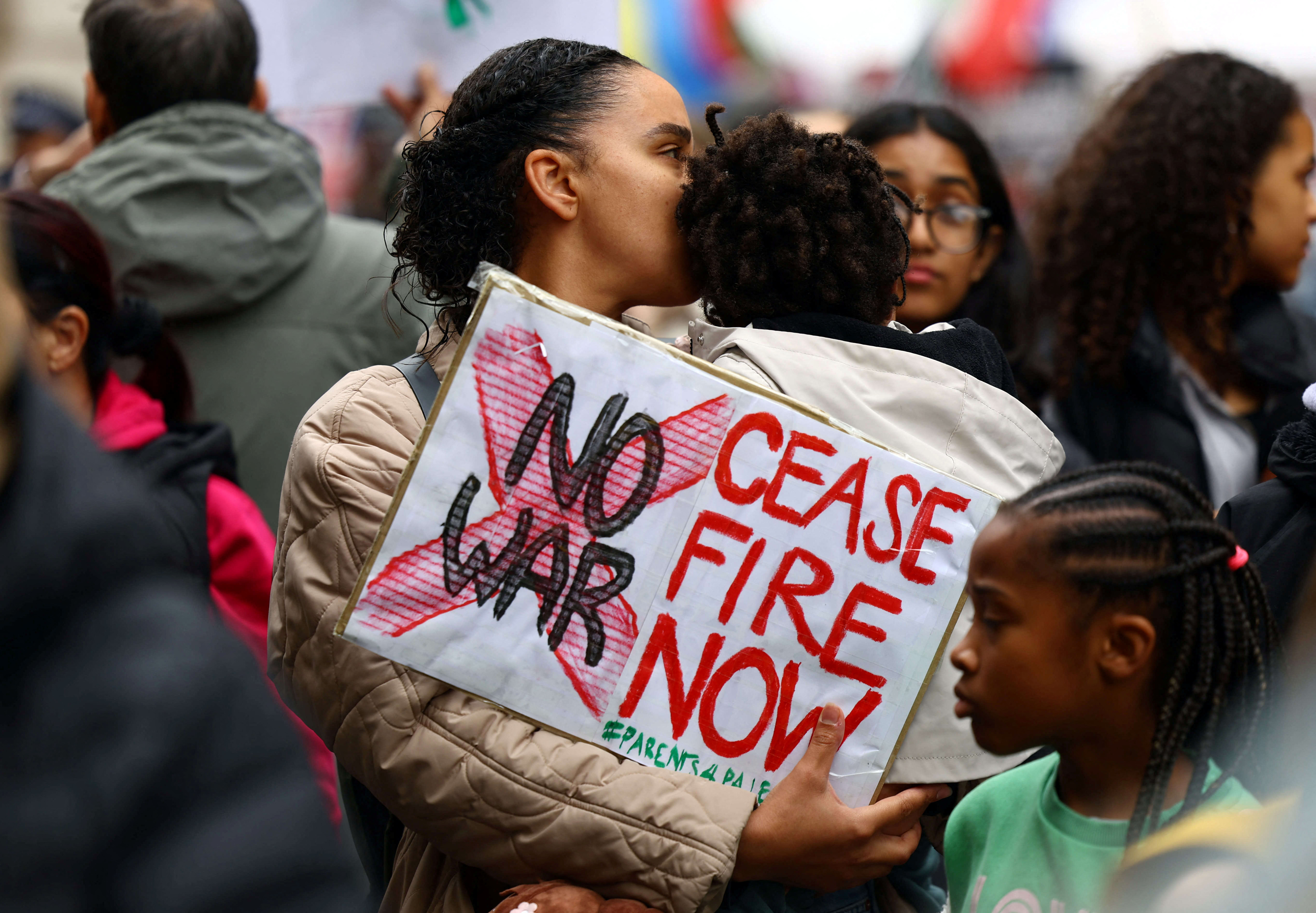
The Left is doing something right.
And it’s something that I initially disagreed with, even though I didn’t comment in a public space.
When Israel overreacted to Hamas’ October 7th attack on western Israel with a brutal saturation bombing campaign against the Palestinian civilian population of the Gaza Strip, defenders of human rights, antiwar activists and supporters of the Palestinian liberation movement demanded a ceasefire.
To me, that felt like yet another example of the Left settling for too little, negotiating against itself. Ask for the stars, I usually advise, and you might settle for the moon. Ask for the moon and you might wind up with nothing. A ceasefire isn’t an armistice, much less a peace agreement. It’s merely an interruption in a war. What kind of antiwar activist doesn’t ask for an end to a war?
One of the most famous examples is the Christmas Truce of 1914, when German and British troops crawled out of their trenches and met in no-man’s land to exchange presents, play soccer and celebrate the holiday together. A day or two later, however, World War I resumed. It’s a cute story that changed nothing.
Israel owes the people of Gaza nothing less than an immediate cessation of hostilities and official acceptance that the current conflict is a war crime for which top Israeli governmental and military officials should be prosecuted. The IDF should withdraw. Israel should pay to rebuild everything it destroyed and compensate the families of dead and wounded Palestinians. It should house everyone it has displaced on Israeli territory, in Tel Aviv and Jerusalem if need be. It should recognize a free and sovereign Republic of Palestine in Gaza and the West Bank, with East Jerusalem as its capital, within 1967 borders along with a safe corridor to connect the currently non-contiguous borders. The 700,000 settler-colonists should leave the West Bank and return to Israel.
A ceasefire seems so tiny by comparison.
Which is why it’s proving effective as a demand.
When people confront two parties engaged in a conflict, one of their first reactions is to try to assess which, if either, is right (or at least more right). This determination is affected by such cognitive biases as whether one side looks or acts more like the person making the assessment. In the Israeli-Palestinian conflict, some Americans have baked-in personal allegiances because they are Jewish or Muslim.
Which leaves the other 97% of the population. Citizens of the United States are notoriously ignorant about politics and cultures beyond their borders. To the extent that they pay attention to the Middle East conflict, there has been a historical bias in favor of Israel, a fact that Israeli Prime Minister Benjamin Netanyahu and his ally President Joe Biden relied upon at the beginning of the war in Gaza. As we have seen in the past, however, Israeli overreaction has prompted the public to take a closer look and, following the usual practice, led them to a “pox on both of their houses” stance. Deputy National Security Adviser K.T. McFarland repeated that trope in 2020 when she claimed on Fox News that in “…the Middle East, they’ve been fighting for 4,000 years. It’s been an ethno-sectarian battle and psychodrama, and they’ve been killing each other for millennia. Their normal state of condition is war.” (This is not even a little bit true, but let’s leave that for another time.)
20,000+ dead Palestinians into the latest episode of the conflict, the Gaza war has become a catastrophe too big to ignore or dismiss with glib inanities. Day after day, as Americans’ social media feeds fills with bloody images of dead Palestinian babies, initial public sympathy for Israel has given way to a feeling that the Palestinians of Gaza are victims at least as much as the Israelis of October 7th. Choosing sides is no longer easy. But one thing is clear: the carnage has gone on too long and, even if a long-term conclusion like a two-state solution is impossibly elusive, the bombing simply has to stop.
By mid-December, three out of five American voters—with few differences between political parties—supported a ceasefire, up significantly from October. The public had caught up to the pro-Palestinian activists. By not asking for much, the Left appears moderate and reasonable.
Meanwhile, voters keep reading headlines in which the Israeli government is refusing a ceasefire. To the contrary, Netanyahu says the war will continue for “many more months.” Israel is framing itself as rabid, overreaching and bloodthirsty.
Because it is out of sync with public opinion, good will for Israel is ebbing like the pulse of a man bleeding to death from a gunshot wound. Although older voters still tend to support Israel, a mere 28% of voters between ages 18 and 29 told the latest New York Times/Sienna College poll that they believed Israel was seriously interested in a peaceful solution. On the other hand, half said the Palestinians do want peace.
(Ted Rall (Twitter: @tedrall), the political cartoonist, columnist and graphic novelist, co-hosts the left-vs-right DMZ America podcast with fellow cartoonist Scott Stantis. You can support Ted’s hard-hitting political cartoons and columns and see his work first by sponsoring his work on Patreon.)
Gaza Land Acknowledgement
Following the doctrine that it is easier to beg forgiveness than to obtain permission, Israel is engaged in the ethnic cleansing of the Gaza Strip, with a view toward annexing it. It’s not hard to imagine that, sooner rather than later, beach resorts will replace the 2.3 million Palestinians who have been killed or driven out of their homeland.
Some Help with Our Ethnic Cleansing, Please
One of the more tone-deaf talking points of Israel and its supporters is to accuse neighboring Arab states of being cruel to the Palestinians because they refuse to accept them as refugees. Setting aside the fact that countries like Egypt and Jordan already have millions of Palestinian exiles from previous wars, Israel is tacitly admitting that they are trying to impose ethnic cleansing against Palestinians. Like Germany before World War II, which demanded that other countries accept Jews, Israel wants to turn Arab states into collaborators.
Hamas to Israel: Thank You, We’ll Have Another
Israel says it wants to eliminate Hamas specifically, and radical Islamism generally, in Gaza. Ironically, its war against the Gaza Strip, in which the vast majority of victims are innocent civilians, will only serve to recruit a bigger generation of angry Palestinians to the anti-occupation resistance.
DMZ America Podcast #126: Gaza Left vs. Right, Alabama’s Universal Basic Income
Political cartoonist Ted Rall (from the Left) and Scott Stantis (from the Right) discuss the week in politics and current events and culture. This week, the war between Israel and Hamas in the Gaza Strip and Birmingham, Alabama’s experiment with a universal basic income.
In the first segment of this week’s DMZ America podcast, Ted and Scott dig deeper than ever before into the domestic and international implications of the war in Gaza. The two cartoonists delve into Israel’s right to exist, Israel’s treatment of Palestinians in administrative detention, hostage exchanges, and whether there is a future two-state solution or whether a future single Republic of Palestine could reasonably accommodate members of all ethnic groups.
In the second part of the DMZ America podcast this week, Scott explains an experiment in his hometown of Birmingham, Alabama in which single women are paid a universal basic income of $385 per month. The mayor says he wants to renew it because it’s doing well. Should a universal basic income be adopted by the United States? Ted and Scott talk about the economic and cultural risks and rewards of giving people a paycheck without having to work, with an emphasis on the fact that automation and artificial intelligence may make it so that society has no choice.
Watch the Video Version of the DMZ America Podcast:
DMZ America Podcast Ep 126 Sec 1: Gaza — Left vs. Right
DMZ America Podcast Ep 126 Sec 2: Alabama’s Basic Universal Income
DMZ America Podcast #120: Hamas Goes to War with Israel
Hamas fighters swarmed into Israel from the Occupied Gaza Strip, which has been subjected to a grinding economic blockade since 2007, killing Israeli civilians and soldiers and taking hostages. Political cartoonists Ted Rall (from the Left) and Scott Stantis (from the Right) debate the Israeli-Palestinian conflict and the ramifications of what Israelis are calling their 9/11. Scott, an ardent defender of Israel, tries to find common ground with Ted, who supports Palestine’s independence struggle.
Watch the Video Version of the DMZ America Podcast:
DMZ America Podcast Ep120: Hamas Goes to War with Israel

